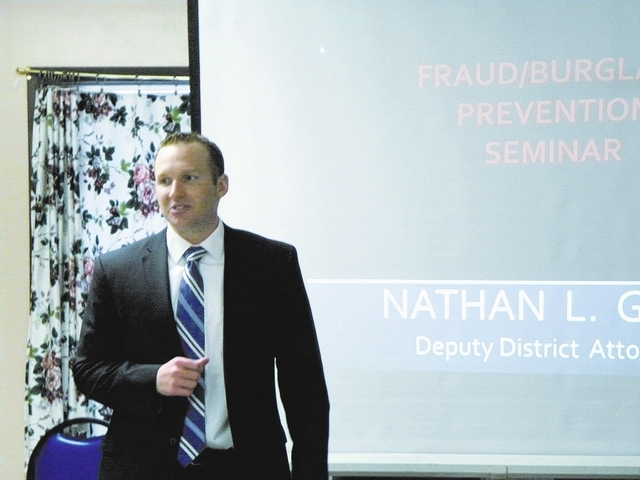
While identity theft is often not a crime of physical violence, it still hurts.
Affecting finances, credit scores and even reputations, ID theft can do serious damage to victims.
To help protect Nye County seniors against such invasions of privacy, local Deputy District Attorney Nathan Gent Thursday gave a presentation on fraud prevention at the Pahrump Senior Center.
“NRS 205.463 makes it a crime to use the personal identifying information of another individual with intent to fraudulently obtain credit, property or services. It also takes into account computer and internet technology and makes it a crime to aid or abet another person in securing a person’s identifying information. Anyone convicted of using another person’s identity can face up to 20 years in prison and a $100,000 fine,” he said.
Gent told those present at the seminar that victims of identity theft have exactly 60 days from the time their accounts have been compromised to notify their banks and creditors of the fraudulent activity. If they don’t, the banks could refuse to cover it
“That’s why it is so important to regularly monitor your credit reports and to safeguard your credit,” he said.
The deputy district attorney suggested people stay up to date on those materials by asking for their free yearly copy of their credit reports from the three national credit report agencies, Equifax, TransUnion and Experian.
To make it more beneficial, one audience member even suggested taking the free reports from those companies at three separate times of the year to keep on top of their credit all year long.
While keeping track of credit is one way to be proactive about protecting people from identity theft, Gent said another way is to recognize when a money opportunity or sales pitch is a front for a phishing scam trying learn potential victims’ personal information.
Gent said phrases like “you’ve won a prize,” you’ve been selected to receive a special offer,” “you must act immediately or lose out” and “you must pay for shipping your prize,” should all be considered suspicious, especially if someone doesn’t know who the company is that’s contacting them about the prize or if they want money for a “free” prize up front.
Additionally, any emails or physical mail a person receives claiming to be a real company wanting to verify a person’s information or asking them to donate to a charity or buy something from a company that sounds similar to an actual legitimate company should be considered suspicious as well.
“The key is to verify, verify, verify,” he said. “You’ve got to find out what the company’s name is, what the person’s name is who’s trying to sell to you. I heard about a guy that was actually going around selling advertisement for a legitimate magazine, but it turned out he wasn’t an employee of that magazine. So you want to make sure you write down the company name, write down the employee’s name and then verify. Is this person really working for this company? Is this actually a legitimate company?” he asked.
Gent said a few tips to avoid falling prey to these types of scams is simply to never give out personal information to someone calling to try and sell something or give something away; never allow a stranger trying to sell something or give something away to come into your home; never believe that a stranger will use your money for a good cause; never assign power of attorney to someone you don’t know well; and, never sign a contract with blank lines which someone says they will “fill in later.”
If for whatever reason someone does become a victim of identity theft, Gent said the first thing they should do is call the non-emergency number for the sheriff’s office and ask to make a report to help them show to their banks and creditors they have been a victim of fraud.
Gent said with this information he hoped at least one person at the seminar would be better equipped to protect themselves from identity theft and to keep themselves from becoming a victim.
If someone thinks they have been a victim of identity theft they can make a report by calling the Nye County Sheriff’s Office at 775-751-7000. For more information on fraud and identity theft those interested can visit the Nevada Attorney General’s website at ag.nv.gov.